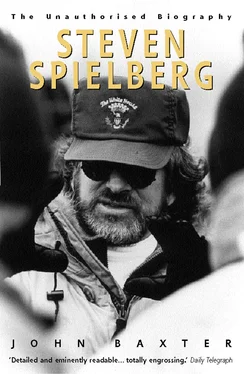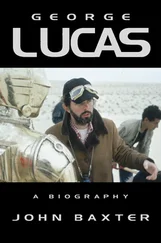He might have got away with it had Crawford been as malleable on set as off. Instead, she exhibited a steely stubbornness, bombarding him with questions about her character. ‘Joan was climbing the walls while they were filming,’ recalled Serling’s wife Carol. ‘She was calling Rod all the time, and he reassured her.’
Under his tan, Spielberg was in a cold sweat. Seeing him pale, Barry Sullivan took him aside and told him something he would never forget: ‘Don’t put yourself through this,’ he said, ‘unless you absolutely have to.’
Spielberg saw he had no choice but to accede to most of Crawford’s demands. When she couldn’t remember her lines, he printed up cue cards, at Sullivan’s suggestion, with print large enough for her to read through her bandages. He agreed as well to the retakes she requested, knowing that to deny her could lead to a catastrophic confrontation in front of the crew.
With her young director under control, Crawford relaxed. She gave him cologne, and a bracelet. He responded by placing each morning, in her dressing room, a single rose in a Pepsi bottle. A loyal Pepsi drinker, Crawford belched every time she finished a bottle – a sign of enjoyment, she explained. When Spielberg told her he’d never learned how to belch, she taught him.
The price of conciliation was delay. At the end of the shoot, two days of script remained unfilmed. Sackheim stepped in and directed the last day. A few days later, Spielberg showed Sackheim his rough cut. The producer sat next to Spielberg in the editing room, groaning faintly at each new visual excess.
‘We’re going to have to perform major surgery on your show,’ Sackheim said at the end.
‘And he went in,’ said Spielberg, ‘and shifted the vision from my choices to his own choices.’
Exhaustion and depression forced extreme decisions. ‘I was in a despondent, comatose state,’ Spielberg recalled. ‘I learned a lot of lessons with that show, but rather than say, “Well, I’ll let that roll off my back and go on to the next show,” I went to Sid Sheinberg and said, “I can’t do TV any more. It’s just too tough. I quit.”’
Wisely, Sheinberg refused his resignation. Instead he offered a year-long leave of absence. ‘So my salary was suspended and I went home and wrote for a year. All I did was write.’
Spielberg’s first thought had been to break into the underground, where some of the USC group were making their reputation. ‘I went to the underground to make films in 16mm – and I couldn’t get in there. I could not raise $100 to make a film.’
Networking had won him a few useful contacts at Universal. One was composer John Williams. Spielberg admired his music for Mark Rydell’s version of William Faulkner’s The Reivers , folksy and ebullient by turns. Its cross-fertilisation of the American tradition with the European – ‘like a combination of Aaron Copland and Debussy’, Spielberg said – marked Williams as someone who shared his taste.
Another new acquaintance was Cliff Robertson. As much a victim of the TV ghetto as Spielberg was, the boyish-looking actor had starred in The Hustler and Days of Wine and Roses on TV, only to see Paul Newman and Jack Lemmon click with them in the cinema. When he appeared in The Two Worlds of Charlie Gordon , a teleplay based on Daniel Keyes’s story ‘Flowers for Algernon’, about a mentally handicapped man who becomes a genius through experimental surgery, Robertson recognised a potential hit and bought the film rights himself, adapting it into the screenplay Charly . Seven years later, in 1968, his foresight was rewarded with an Academy Award for Best Actor.
Robertson was Spielberg’s first call after he started his leave. The actor loved World War I aircraft and, after the success of Charly , he wrote a treatment for a flying movie called I Shot Down the Red Baron, I Think , which would use rare original aircraft accumulated by another fanatic in Ireland. Robertson’s agent, David Begelman, sold the idea to Cinerama Corporation for $150,000, but the project bogged down in wrangles over finance, in which, to Robertson’s fury, Begelman sided with Cinerama. Robertson was forced to pay $25,000 to Cinerama, with a further $25,000 if the film was ever made. In sworn depositions, he claimed Begelman ‘sandbagged’ and ‘completely subverted’ him.
Aware of this debacle, and knowing Robertson’s interest in old planes, Spielberg offered him a treatment he’d written with a friend, Claudia Salter, about a World War I flyer and his son barnstorming around America in the early twenties. Robertson liked Ace Eli and Rodger of the Skies . He bought it, hiring Salter to write a screenplay.
After graduation from USC, Hal Barwood and Matthew Robbins had tried to sell some screenplays, but without success. Spielberg began feeding them his ideas. George Lucas was staying with the writers while he cast what would become his first studio feature, American Graffiti . The abstracted Lucas seldom spoke to anyone as he wandered in and out, but to him it seemed the dweeby guy with the big nose and the glasses was there almost all the time. Spielberg’s voice filled the house as he leaned over the shoulders of Robbins and Barwood, suggesting lines, laughing at those they’d written, and urging them on.
One of Spielberg’s ideas was a comedy he’d already tried to float at Universal, a modern Snow White , about seven men who run a Chinese food factory in San Francisco. Another was based on a clipping from the Los Angeles Citizen News about a May 1969 Texas incident when Ila Faye Dent, just released after a shoplifting conviction, persuaded her husband Robert to break out of prison to retrieve their two-year-old daughter from court-appointed foster parents. On the way, they kidnapped state patrolman James Crone, which led to a massive car chase across the state.
From this story, Barwood and Robbins, with Spielberg’s collaboration, worked up the tale of Lou Jean and Clovis Poplin’s flight in search of Baby Langston. Police Captain Tanner, hamstrung by the incompetence of his men and the young couple’s sentimental appeal, trails them with a motorcade as they bumble across Texas. Crowds cheer them and high school bands play them through town, while well-wishers offer free gas and chicken dinners, and fill the car with gifts. Even the vigilantes who ambush them on a used-car lot manage only to riddle the cars and do no harm to the fugitives at all. The dream dies at the end, when Clovis is killed, but until then it’s a folk tale straight from Reader’s Digest . The screenplay was called ‘Carte Blanche’, then ‘American Express’, but later it was renamed, in honour of the town towards which the Poplins were fleeing, The Sugarland Express .
Each decade throws up its hot writing teams, and Barwood and Robbins were to be as hot as any during the seventies. Episodic and oriented totally towards action, their work seems mechanical today, a loose stringing together of action sequences, owing more to animators like Chuck Jones, Tex Avery, Frank Tashlin and Walt Disney than to the meticulous plot- and scene-builders of the 1940s. But Spielberg called them ‘geniuses’ and praised their ‘wonderful cartoon imagination’. Once Barwood and Robbins went on to direct their own films, he found and encouraged other partnerships like theirs. Robert Zemeckis and Bob Gale, his protégés in the eighties, were Barwood and Robbins writ large, not least in their fascination with animation.
As if to underline the comparison with Jones and Avery, Barwood, Robbins and Spielberg put Lou Jean and Clovis into an Indian Chief mobile home on a used-car lot and had them watch Chuck Jones’s Road Runner evade Wile E. Coyote on the screen of a nearby drive-in cinema. Spielberg lavished all his craft on this scene when the film was finally made. Birdus Fleetus and Lupus Persisticus (Jones’s cod-Latin names for his hero and villain) were his boyhood heroes, and he prevailed on Universal to buy from Warners forty seconds of Jones’s cartoon to underline the film’s most poignant moment.
Читать дальше












